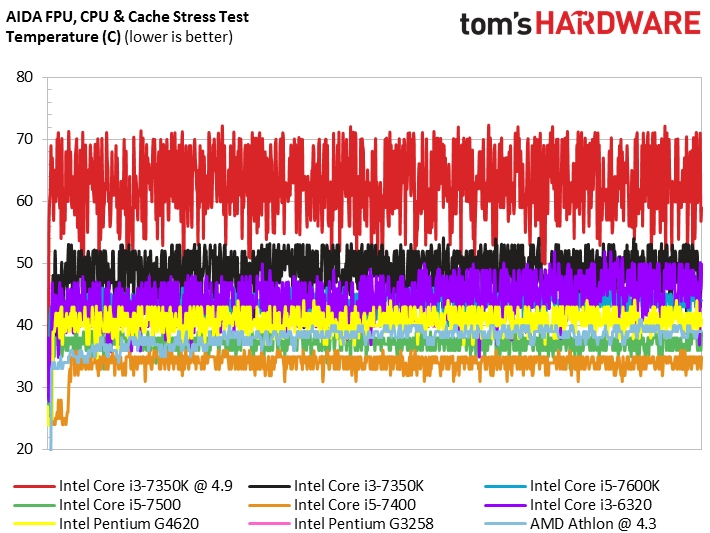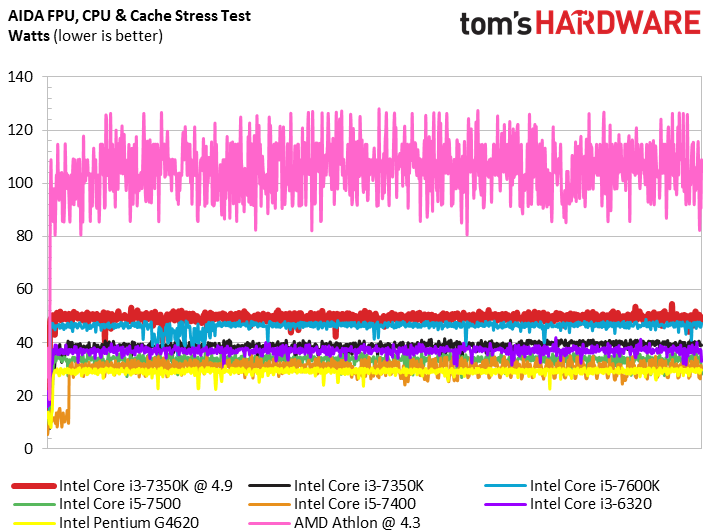Intel Core i3-7350K Review
Why you can trust Tom's Hardware
Overclocking & Power Consumption
Most of us tend to use specialized tools for validating the stability of our overclocks. However, most of these utilities punish the CPU with severe workloads that go beyond the scope of normal applications. Intel's Kaby Lake platform includes the novel AVX Offset feature, which automatically dials back frequency when the CPU encounters taxing AVX instructions. Our MSI motherboard allows us to specify an offset in 100 MHz increments.
We didn't use the feature for our testing, but AVX Offset may come in useful if you're chasing the upper limits of your CPU's available headroom and need to account for the extra heat AVX instructions generate.
Unlocked multipliers simplify overclocking, and access to this ratio is the Core i3-7350K's biggest selling point. We overclocked the -7350K to 4.8 GHz by specifying a 48x multiplier, increasing voltage to 1.34V, and setting the Load Line Calibration to Level 4. After we found stable settings, we bumped up to 4.9 GHz and 1.355V.
These settings were stable during our entire test regimen, and after various stress tests. We were also able to boot into Windows and run light workloads at 5 GHz. However, intermittent instability and the need for 1.41V+ sent us back to a safer 4.9 GHz. Reports of -7350Ks capable of 5 GHz abound, but when it comes to the silicon lottery, your mileage may vary.
With Corsair's H100i v2 cooler sitting atop these mainstream CPUs, managing thermals wasn't a challenge. Although we recorded temperatures with AIDA, variance in the ambient temperature exaggerates the true difference between models and test runs. The chart does show that we didn't run into thermal limitations under heavy load, though (Intel's Core i3-7350K at 4.9 GHz peaks at 70°C).
We also measured power consumption during the stress test. AMD's Athlon X4 750K consumed over 100W. This is obviously well above the modern Intel processors, which all managed to stay below an average of 50W. The overclocked Core i3-7350K pulled an average of 49.5W, and the stock -7350K only consumed 38.5W. The Core i5-7600K averaged 46W, while our measurement tool reported the Core i5-7400 and -7500 using 33W and 30W, respectively.
Get Tom's Hardware's best news and in-depth reviews, straight to your inbox.
Current page: Overclocking & Power Consumption
Prev Page Office & Productivity Applications Next Page Conclusion
Paul Alcorn is the Editor-in-Chief for Tom's Hardware US. He also writes news and reviews on CPUs, storage, and enterprise hardware.
-
Justiceinacan As someone who just enjoys overclocking and was coming from an FX chip, it is nice but I agree with the rest of the article ; a locked i5 is a very solid chip for similar pricing to the unlocked i3 which may fare better or worse.Reply -
Sakkura It simply needs to drop $20. I suspect they may have launched this chip, and the hyperthreaded Pentiums, as a precaution for Ryzen. Intel doesn't usually adjust pricing, but I would not be the least bit surprised if the 7350K becomes an exception after the Ryzen launch (assuming things go well for AMD).Reply -
ubercake These processors are $159 at microcenter. That's the $20 price drop Sakkura is looking for! I think I'd still just fork over the additional $40 (again microcenter) for the i5 though.Reply -
InvalidError Given how expensive the top-end i3 has become and the extra expenses that go in actually leveraging its overclockability, I'd say that the i5-7400 with a h270 motherboard would be the better bang-per-buck option in most cases. At least until Ryzen comes along 2-3 weeks from now and redefines what good bang-per-buck is.Reply -
ubercake I really hope Ryzen lives up to the hype. I can't wait to see the R7 1800X vs. i7-6900K reviews.Reply -
Ashwaganda With 168$ MSRP this cpu just isnt attractive, considering i5-7400 182$ MSRP.Reply
Even if you could overclock it with cheaper H110/B150/B250 board, the i5-7400 is a better buy. Also the 63$ Pentium G4560 utterly destroys i3-7350K by value.
Sure G4560 does not have AVX instructions, but who cares. For gaming and everyday use purposes AVX doesnt offer any real benefit. -
bak0n The only reason I'd pick up this would be for playing games like Sins of a Solar empire that don't make use of enough cores and loads the screen with lots of processing at end game.Reply -
logainofhades These are selling for $180 right now. Simply not worth it. At least the pentium G3258 was priced close to its locked siblings. The price needs to drop, significantly. At current prices, and with the hyperthreaded Pentiums, the i3 is kinda irrelevant right now. Wonder if Intel knows something about Ryzen, that we don't, because these recent moves don't make a lot of sense.Reply -
why_wolf I really get the feeling this chip is being setup so Intel can drop the price on it if AMD eats to much of the low end market. As it stands right now, at this price point, I'd have to agree going to an i5 instead makes way more sense for the majority of users out there.Reply -
Math Geek the G4620 stands out more in this review to me than this i3 does. at ~$90 it is a much better buy than this i3 for a true budget build. once it's price drops in response to AMD, then it will be worth a revisit once we know what AMD has to offer. but for now, i won't be recommending this cpu to anyone. locked i5 much better bang for the buck with the locked i3 or this new HT Pentium for a budget build.Reply

